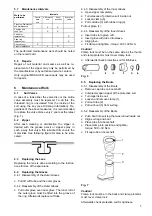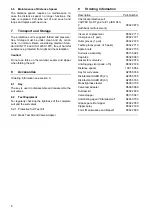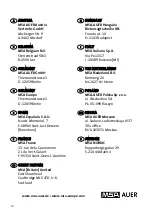
4
1
Designation, Marking
1.1 Designation
Chemical Protective Suit VAUTEX SL-S
Type 1a ET prEN 943-2
EEC Test No.: 3710A/00/50 PSA
1.2 Marking:
See label on the inside of the suit.
2
Application
The protective suit is not a breathing apparatus by
itself. It must be worn with a compressed air breath-
ing apparatus. With the apparatus the suit protects
the wearer against toxic agents and materials
harmful to the skin as well as oxygen deficiency.
With the compressed air breathing apparatus the
wearer can move around freely.
Wearing a protective suit and compressed air
breathing apparatus will put a physical strain on the
wearer - he must, therefore, be in good physical
condition. During application proper safety meas-
ures must be taken and observed.
3
Design of the Protective Suit
3.1
Design
The one-piece suit is made of a compound material
and has a replaceable lens, tightly attached and
replaceable gloves and boots, a gas-tight zipper and
three suit valves.
Under the lens of the chemical protective suit
VAUTEX SL-S there is a distance spacer which
improves the user's freedom of movement.
The back section is enlarged to accommodate a
compressed air breathing apparatus. On the inside
is a reinforcement which can be unbuttoned.
The spacious head part allows wearing a protective
helmet inside the suit. To fit various helmet sizes an
adjustable strap is fixed between the suit valves.
The zipper is on the front, from the right leg to the
head.
3.2
Operation
Breathable air is supplied from the compressed air
breathing apparatus that is worn on the back. The
exhalation air passes through the exhalation valve of
the facepiece into the inside of the suit and then
through the suit valves into the ambient atmosphere.
3.3 Technical
Data
Protective suit, complete, but without compressed
air breathing apparatus and full facepiece:
Weight :
approx. 9,0 kg
Size according to EN 340:
universal size
Gloves: size
10
boots according to
S5 EN 345 HRO: size 46
3.3.1 Mechanical Performance of the
Suit Material according to prEN 943-2
Performance
Requirement
Relevant
Standard
Classi-
fication
Abrasion Resistance
EN 530
Class 6
Stability to Heat
(Blocking Resistance)
ISO 5978
Class 2
Flex Cracking
ISO 7854
Class 5
Flex Cracking at -60°C
ISO 7854
Class 2
Trapezoidal
Tear Resistance
ISO 9073-4
Class 3
Burst Resistance
ISO 2960
Class 6
Puncture Resistance
EN 863
Class 4
Resistance to Ignition
EN 1146
Class 2
Seam Strength
ISO 5082 A2
Class 5
3.3.2 Resistance to Permeation by Chemicals
according to prEN 943-2
Chemical
Substance
Suit-
material
Class
Seam
Class
Inner
Gloves
Class
Visor
Class
Boots
Class
Acetone
5
5
4
6
3
Acetonitrile
4
4
6
6
4
Ammonia (gas)
4
4
6
6
6
Carbon Disulphide
5
5
6
6
3
Chlorine (gas)
4
4
6
6
6
1,2- Dichloromethane
2
2
2
6
2
Diethyl Amine
1
1
1*)
6
5
Ethyl Acetate
3
3
2
6
4
n - Hexane
5
5
6
6
6
Hydrogen Chloride (gas)
4
4
6
6
6
Methanol
5
5
6
6
6
Sodium Hydroxide 40 %
5
5
6
6
6
Sulfuric Acid 96 %
5
5
6
6
6
Tetrahydrofurane
1*)
<1*)
1*)
6
4
Toluene
4
4
6
6
5
*) Note: Not suitable for use of these chemicals under
continuous
exposure.
According to internal tests for these chemicals a class 2
achieved when the attached outer gloves are applied.





































